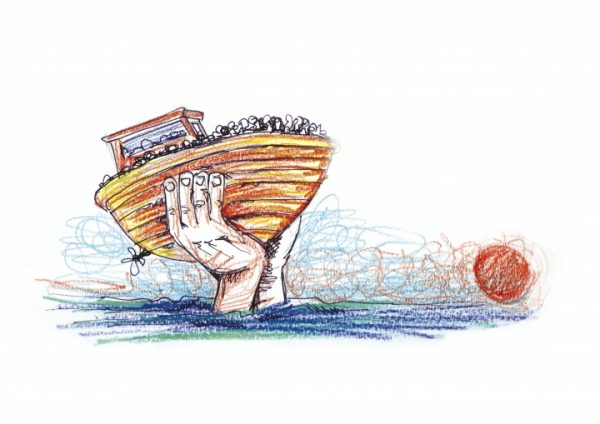- Mediterranean Hope - Federazione delle chiese evangeliche in Italia
- mh@fcei.it
Refugees, new protocol for a thousand more arrivals with humanitarian corridors from Lebanon
Leggi in Italiano
Rome (NEV), 5 August 2021 – A new protocol was signed today between the Community of Sant’Egidio, the Federation of Protestant Churches in Italy (FCEI), the Tavola Valdese (Waldensian Board) and the Ministries of Interior and Foreign Affairs granting another thousand refugees currently hosted in Lebanon entry into Italy through humanitarian corridors, a best practice recognized internationally and replicated with similar projects in France, Belgium, Andorra and San Marino.
The agreement with the Italian State was signed by Luca Maria Negro, president of the FCEI, Alessandra Trotta, moderator of the Waldensian Board, Marco Impagliazzo, president of the Community of Sant’Egidio, Luigi Maria Vignali, Director General for Italians Abroad and Migration Policies of the Ministry of Foreign Affairs and International Cooperation, and the prefect Michele di Bari, head of the Department for Civil Liberties and Immigration.
Thanks to the first two agreements of 2015 and 2017, more than 2,000 refugees (mostly families and individuals in vulnerable conditions from Syria) have already arrived safely and legally in Italy, through an entirely self-financed project, which not only thwarts traffickers and risky voyages in the Mediterranean, but also facilitates their integration in our country.
The thousand who benefit from the new agreement, which lasts two years, will be selected by the signatory associations in Lebanon and other transit countries affected by emergency humanitarian situations.
“We are immensely satisfied to see the confirmation of a new agreement. And we extend our appreciation to the Ministry of the Interior and Foreign Affairs for having recognized and reaffirmed the value of a concept, conceived and developed primarily in our country – declares pastor Luca Maria Negro, president of the Federation of Protestant Churches in Italy. The signing of a further protocol to set up humanitarian corridors confirms the validity of a clear insight expressed six years ago: opening legal, safe and sustainable routes is the most effective alternative to deaths at sea and human trafficking. This concept, conceived and developed in Italy, has been taken up in other European countries but unfortunately it has not become a European policy yet. That is why, as protestant churches, we will continue to work with our partners in Europe to put pressure on their governments to widen the legal and safe routes of entry into their respective countries. Migration is the field on which the notion of a united Europe may collapse, as it is hampered by national selfishness and political opportunism. But we want to hope that it can also be the theme on which Europe finds the soul and the vision for which it was created as a union of peoples and states. The humanitarian corridors are a concrete testimony of what Europe could be and could do to resolve, with specificity and a humanitarian spirit, a knot that cannot be untied with proclamations of security or military force but rather through cooperation in the development and protection of human rights”.
“The sovereignty some governments and some political forces pursue is not only the tomb of political Europe but also of the principles of solidarity, international cooperation and defense of human rights around which it was formed – adds Paolo Naso, consultant for institutional and international relations of the FCEI, former coordinator of Mediterranean Hope, the FCEI migrants and refugees program, creator of the humanitarian corridors concept. After working together for almost six years, we have witnessed lives “broken” by violence, abuse, torture and despair that have been rebuilt thanks to an exceptional plan of action to assist and support guaranteed by those who welcomed it. Genuine miracles of resurrection brought about by God’s love for his creations”.
During today’s meeting in which the new protocol was signed, the moderator of the Waldensian Board, Alessandra Trotta, reiterated “the importance of the continuity of a best practice that the Waldensian and Methodist churches have reported and proposed to sister churches in Europe; the commitment to help and accommodate others, for us rooted in our faith but on this ground we have met with many other institutional and associative realities; the results evident in all of the paths of integration, an essential component of the corridors”.
The Waldensian Diaconia, as the moderator recalled, “adopted a model of widespread integration, with small groups, and assisted by operators and volunteers who together sought individual solutions consistent with the needs and capacities of the beneficiaries”. Which explains the “satisfaction to see the collaboration between the institutions – the Ministries of the Interior and Foreign Affairs – and the United Nations High Commissioner for Refugees. Not only because this synergy has worked but because what has been achieved constitutes a secular and fair organizational model of a social intervention. The value of humanitarian corridors lies in the ability to replicate them and in the possibility of transforming them into an Italian and European system. The Waldensian and Methodist churches have signed this protocol fully cognizant that it is a great commitment but also a great opportunity to show that hospitality and human rights, security and sustainability can work hand in hand. And this is the message that we, together, would like to reaffirm today.”




